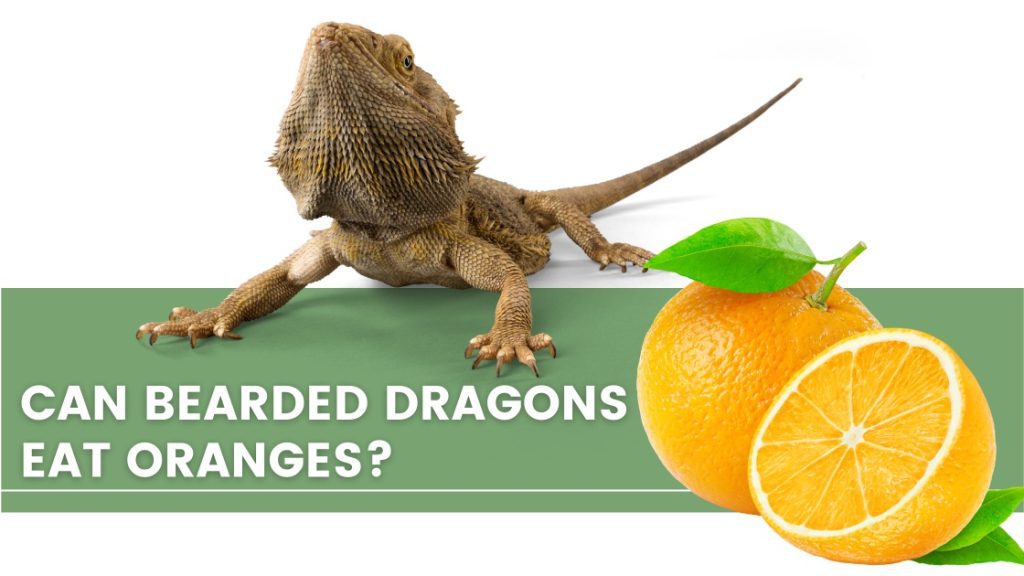
The Yea Or Nay Of Feeding Oranges To Your Beardie
If you’ve asked the question “Can bearded dragons eat oranges?” – we’ll right off the bat have to tell you that oranges should never be part of your bearded dragon’s diet.
The main reason is that oranges contain a high amount of sugar combined with their acidic nature. The combination of these two factors can cause a multitude of health problems for your beardie, including diarrhea.
Read on to learn more about the real reasons why you should not feed your beardie any oranges, and how to keep them safe.
The Dangers Of Feeding Oranges To Your Bearded Dragon
High Sugar Content
Oranges like other citrus fruits have a high sugar content and you should always be aware that too much sugar in your beardie’s diet can cause obesity, fatty liver disease, diabetes, and heart failure.
Loss Of Teeth
Just like us humans, foods that are high in sugar and acid can cause tooth decay and the loss of teeth. Apart from that and other than humans, the bearded dragon’s teeth are fixed directly to their jaw, and tartar or plaque build-ups can cause inflammation or infection to their bones.
Diarrhea
The high levels of sugar and acidity can cause your beardie to have an upset stomach. This can cause a loss of appetite and diarrhea. Diarrhea can cause dehydration and your beardie can become very sick.
Now you might say that your bearded dragon is a desert animal and can cope with dehydration, but dehydration due to feeding your beardie oranges is very different from regular dehydration.
Oxalic Acid
Oranges and other citrus fruit contain very high amounts of oxalic acid. This acid binds with calcium and creates calcium oxalate which basically takes calcium away from your beardie’s body.
This action can cause Metabolic Bone disease which can make your beardie suffer from soft bones, limb deformities, and paralysis. In severe cases, this disease can be fatal to your beardie.
Citric Acid
Similar to the high sugar content in oranges, the acids from oranges and other citrus foods can negatively impact your beardies digestive system. This can cause diarrhea and eventually dehydration by irritating the stomach lining.
Low Calcium Levels
In general, all fruit is low in calcium. With this said, it is a fact that calcium is of utmost importance in your beardie’s health. To prevent a calcium deficiency, you should try to feed it high amounts of calcium through its diet.
If you feed them foods that are low in calcium and nutritionally poor, it can lead to health problems and metabolic bone disease.
Can Bearded Dragons Eat Orange Peel or Orange Juice?
Absolutely not! Orange peels do not have the texture making it easy for your beardie to consume. It is very acidic which is very dangerous to your beardie’s health. Orange peels contain a lot of oxalic acid and orange oils.
Although orange peels are rich in calcium, there is a good chance that they are covered in herbicides, pesticides, and other chemicals. All of these can be fatal to your beardie.
We’ve already discussed the risks of serving oranges to your beardie. Orange juice is not any different from oranges. It has more water, higher sugar content and lots of acids.
Can Bearded Dragons Eat Feeder Insects That Ate Oranges?
Beardies are omnivores and they feed on many insects that have consumed oranges. This includes crickets, lobster roaches, Dubia roaches, and discoid roaches.
There is however no need to worry that they pose a danger to your pet. The reason is that insects have a higher tolerance for the content of oranges. They derive a lot of calcium from oranges and break down the citric acid into smaller, less toxic substances.
You can feed these insects to your beardie without worries, but it is recommended that if you have the feeder insects under your care, you do not feed them oranges more than once or twice per week. Any consumption of orange by the feeder insect more than once or twice per week might also make the insect too acidic for your beardie.
What Is The Verdict?
Although bearded dragons can eat a wide variety of food, oranges should never be given to your pet beardie. Eating oranges can lead to a whole host of health problems for your pet.
If you want to serve your little dragon some fruit, there are more suitable options for your bearded dragon’s diet which include, figs, strawberries, dates, raspberries, apricots etc. Always remember that your beardie is a variety eater and there are many safe foods that you can feed him.
As the owner, it is your responsibility to weigh up the risk and reward of offering your beardie oranges rather than other healthier options that are available.
Continue to read our main article “What do Bearded Dragons Eat?” for all the ins and outs on general diet questions, and get a further detailed breakdown of other popular foods in the articles below:
- Can Bearded Dragons eat tomatoes?
- Can Bearded Dragons eat parsley?
- Can Bearded Dragons eat blackberries?
- Can Bearded Dragons eat pumpkin?
- Can Bearded Dragons eat pineapple?
- Can Bearded Dragons eat cantaloupe?
- Can Bearded Dragons eat green beans?
- Can Bearded Dragons eat cherries?
- Can Bearded Dragons eat asparagus?
- Can Bearded Dragons eat mango?
- Can Bearded Dragons eat cauliflower?
- Can Bearded Dragons eat avocado?
- Can Bearded Dragons eat brussel-sprouts?
- Can Bearded Dragons eat collard-greens?
- Can Bearded Dragons eat wax-worms?
- Can Bearded Dragons eat dandelions?
- Can Bearded Dragons eat nightcrawlers?
- Can Bearded Dragons eat earthworms?
- Can Bearded Dragons eat eggs?
- Can Bearded Dragons eat cicadas?
- Can Bearded Dragons eat basil?
- Can Bearded Dragons eat peaches?
- Can Bearded Dragons eat grasshoppers?
- Can Bearded Dragons eat sweet potato?
- Can Bearded Dragons eat hornworms?

